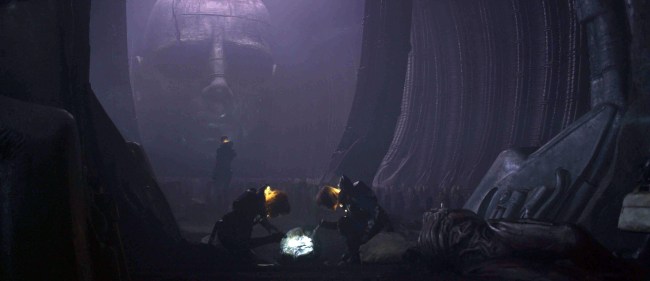At this point, it’s fair to say that no human being who has ever walked the earth has been better at adapting movies into TV shows than Noah Hawley. The man turned “Fargo” into an acclaimed crime anthology series whose only real connection to the Coen brothers film was its distinctly Midwestern brand of dark folksiness. He found prestige TV source material in the “X-Men” franchise with “Legion,” one of the boldest episodic superhero projects of the 21st century.
And now he’s doubling down for his biggest bet yet: “Alien: Earth.” The new series sees Hawley offering an earthbound origin story for Ridley Scott’s iconic sci-fi franchise that IndieWire’s Ben Travers called “a fascinating and frightening extension of an oft-confined space.”
At a private event at Hawley’s Austin offices attended by IndieWire, reporters were treated to a wide-ranging conversation with the showrunner about the gargantuan task of bringing “Alien” to the small screen. Here’s what he had to say about many of the burning questions surrounding his new show.
On Topicality
“Alien: Earth” is often more concerned with mergers than extraterrestrials, following five corporations (including the infamous Weyland-Yutani) fighting for control of the planet and the stars above it. Hawley acknowledged that it won’t be hard for many to find allegories for modern America in the show, but noted that he didn’t try particularly hard to make “Alien: Earth” topical. Instead, he sees it as a natural extension of the class politics that have always infiltrated the franchise.
“I could not have predicted when I first started writing the show a few years back that we would be where we are now in terms of tech companies, etc.” Hawley said. “So it’s like if you try to hit the zeitgeist or if you try to avoid the zeitgeist, there’s kind of no way to game it in that way. So I know that one of the things that ‘Alien’ is, to me, it is a movie about class. You start the first movie with space truckers, and then the second movie [James Cameron’s ‘Aliens’] is about grunts. Paul Reiser is middle management at best, right? There’s this sense of class as a real issue as a 1970s thing that came into it. So I wanted to bring that element into this as well. And it’s just because we’re on Earth, we are engaging with the top class and not just the bottom class.”
 ‘Alien: Earth’Courtesy of Patrick Brown / FX
‘Alien: Earth’Courtesy of Patrick Brown / FX
Where Does “Alien: Earth” Fit Into the Larger Mythology?
There have been a lot of “Alien” movies over the decades, many of which selectively try to erase parts of each other’s lore. Hawley explained that the only two films his show acknowledges as canon are “Alien” and “Aliens,” and he’s not racing to make direct connections with either of them.
“I think we’re telling a parallel story,” he said. “I’m not actively engaging with the films themselves in terms of who’s on the other end of the phone or that idea. So I’m not looking to connect it to those movies literally. I think it’s more taking the elements of original films and expanding them for my own purposes. And it’s sort of remarkable how little mythology there is to a franchise that’s six movies deep. … All we really know about the way humanity is organized is that it’s built around a corporation, the Weyland-Yutani Corporation. And so I just expanded that to more of a corporate power struggle.”
 ‘Prometheus’©20thCentFox/Courtesy Everett Collection
‘Prometheus’©20thCentFox/Courtesy Everett Collection
Why “Prometheus” Doesn’t Exist in This Universe
That means that Scott’s prequels “Prometheus” and “Alien: Covenant” don’t factor into Hawley’s plans, largely due to changes they made to the Xenomorph mythology.
“I think that for me, other than the shark in ‘Jaws,’ this is the most iconic monster in all of film history. And I lived for whatever, 28 years of my life believing that this creature was the perfect organism that had evolved over millions of years,” he said. “And then Ridley made ‘Prometheus’ and engaged with another idea in terms of the origin of these creatures, that it wasn’t part of my DNA of what these movies were to me. And so I chose not to engage with that part of the story and to just sort of speak to the alien that I had encoded.”
Hanging with Ridley
Ridley Scott might be the busiest 87-year-old on the planet, so his involvement in the show was minimal. But Hawley explained that the two men had plenty of conversations about the franchise’s origins — and the famously uninhibited director had more to say than Joel and Ethan Coen did when discussing “Fargo.”
“He told me a lot of stories. Which, of course, is the greatest thing that a filmmaker can have: an audience with the greats. And the Coens are much less forthcoming about everything,” Hawley said of Scott. “Being able to have access to Ridley and the conversations about it. And one of the things as we were researching and building the ship, which as you see is very much reminiscent of the ship from the first film, was that we found all this archival material and blueprints and photos that Fox had had that Ridley hadn’t seen since 1979. So I think there was something really exciting about that idea. And when you build that bridge or the comms room and you step into it, it does this crazy thing where time collapses. You’re stepping into the movie that you grew up watching, and it was just a really profound effect for a filmmaker.”
The Villeneuve Factor
Scott wasn’t the only legendary sci-fi director that Hawley consulted. He explained that one of his biggest influences on “Alien: Earth” were the films of Denis Villeneuve, who took time to offer his thoughts on the project.
“I reached out to Denis Villeneuve when I was making this because I found, as I went through the images that were going up on the mood board, the ones that weren’t from ‘Alien’ were ‘Dune’ or ‘Arrival,’” Hawley said. “And a lot of that has to do with the sense of scale. He’s so good at really feeling the bigness of things, creating, whether it’s a long lens and a full-scale person. And he’s also so great at making something huge that feels so intimate at the same time. So to the degree that he was willing to talk shop with me. We’ve had a couple of conversations about it. Because I think that’s what’s important. The television is not a small screen anymore, and so we’re making these things. I mean, there’s many people who’ve only ever seen ‘Alien’ on a small screen or ‘Dune’ on a small screen, but you can still feel that sense of scale.”
Constant Dialogue
Hawley acknowledged the unique perch he occupies in the entertainment industry, saying that he enjoys adapting films into episodic series, which allows him to frequently offer his own responses to the art he loves without being burdened by the obligation to recreate any of it.
“The first novel that I wrote, I had a little forward to it, and I said, ‘If fiction is a dialogue between writers, I add this into the debate.’ And I feel the same with this,” he said. “I get to engage with the Coen Brothers. You know what I mean? I get to say, ‘Oh, I loved that movie and it made me think this.’ They’re not in a dialogue with me, but I’m in a dialogue with them. And it was the same thing here, or with the X-Men on ‘Legion,’ to be able to say, ‘Oh, I loved how that made me feel.’ And then I had this idea and now I can play with the films themselves, which is really exciting.”
“Alien: Earth” premieres Tuesday, August 12 at 8 p.m. ET on FX and Hulu. New episodes will be released weekly through the Season 1 finale on September 23.


